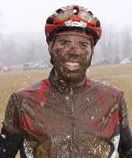Long overdue, here's my take on eating vegan on the road...
In the Northeast, it's almost stage racin' time. The Fitchburg Longsjo Classic begins in two weeks, The Owasco Stage race is the second week in July, and the big'un The Tour de 'Toona is the last week/weekend in July.
For most of us, stage racin' means two things: traveling a lot and eating a lot.
If you are a bike racer, you spend a lot of time traveling. You also spend a lot of time eating. Oftentimes, one finds oneself traveling to far flung locations where vegan options aren't as plentiful or familiar as those closer to home.
So, what do you do when you are racing 3+ days in a row and are 8+ hours away from home
and there's no tofu to be found anywhere?
It sounds like a crisis to me.
Generally, when I'm gearing up for a long race weekend, I pack all the race food I'll need and key staples for recovery and eating.
On the bike:
clif bars
some sort of gel (clif shot lately)
some sort of drink (right now, it's either Heed or Powerbar Endurance)
Recovery:
Aseptically packaged chocolate soy milk (Trader Joe's has reasonably priced 4 pack singles)
Bananas (often purchased once I arrive)
Bagels (again, usually available nearby)
peanut butter (I always try to keep a jar in my race food bag)
General eatin':
This is sort of the key part. Sometimes, it's a little tough to find delicious and nutritious vegan food in, say, Western PA (though, it is entirely possible). I can't do multiple days of pizza without cheese or spaghetti and marinara sauce.
Generally, find a vegan protein option is the toughest part of traveling. Here, vegan protein powders (soy, hemp, pea, rice) are all handy but not the most delicious. A little protein powder and OJ will do you right.
I like to bring my familiar breakfast foods. Usually this is a boxed cereal or instant oatmeal and soymilk. Neither require anything more to prepare than what is available in a cheapish hotel room. I like to mix in ground flax seed in my oatmeal, so I'll bring a bit of that too.
If you get free continental breakfast, hit the bagels, instant oatmeal, cereal, and fruit as much as you can. Just remember to bring soymilk!
For other meals, I like to have a back up plan if eating out is either too expensive or not exactly accommodating for vegans. Some folks bring hot pots. I like to bring a rice cooker. With a small rice cooker ($15 from K mart), you can cook stuff in the hotel room, living room floor, or wherever with very little fuss. A rice cooker will allow you to prepare rice, beans, and steam vegetables.
What should you put in your rice cooker? Dried lentils cook fast. They are a good option. I've been eating a lot of yellow split peas too. Also delicious and fast cooking. Brown rice? That's good too. Maybe some veggies to steam? Sure. Pack some of you favorite spices, and you are good to go for hotel room vegan deliciousness.
I find something like lentils and brown rice
so much more satisfying post-race than the same pasta I often end up eating. It's also so cheap: a 16 oz bag of lentils is $.75, a 5 lb bag of brown rice is $3.49. That much lentils and rice will get you through several days.
So... my race food bag looks a little something like this:
a bunch of clif bars
a bunch of gels
a bunch of drink mix
aseptically packaged chocolate soymilk singles
either singles or cartons (depending if I have a fridge) of regular soy milk
soy protein powder
packets of instant oatmeal
whatever cereal I'm eating at the moment in a zip loc
a baggy of flax seed
a rice cooker
brown rice
lentils, or split peas, or some other fast cooking bean, alternately canned beans would be a good choice, though more expensive and heavier.
assorted spices (usually cumin, cinnamon, red pepper flakes, maybe some nutritional yeast)
Anything else (veggies, fruit, fresh bread) I'll try to find upon arrival.

